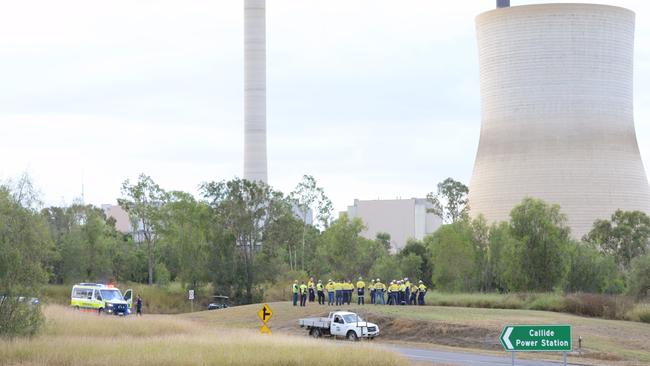Callide Power Trading fined $9m for ‘destructive’ 2021 explosion
Callide Power Trading has been fined $9 million after the explosion of a generator four years ago, which caused “significant, long-term and wide-ranging impacts on the National Electricity Market”.

QLD News
Don't miss out on the headlines from QLD News. Followed categories will be added to My News.
Callide Power Trading has been fined $9 million by the Federal Court for breaches surrounding the explosion of a generator at the Callide Power Station, about 150km south of Rockhampton, in May 2021.
Justice Roger Derrington said the consequences of the breaches were “the destruction of valuable equipment, the potential for loss of life, loss of power to the grid, and significant, long-term and wide-ranging impacts on the National Electricity Market.
“Though the contraventions appear, at first blush, to be minor technical breaches, they were, in fact, very serious,” she said in judgment delivered today.
Justice Derrington found CPT contravened the National Electricity Rules by failing to ensure that the Callide C4 generating unit, which suffered the catastrophic failure, met or exceeded applicable performance standards or was planned, designed and operated to comply with those standards.
CPT is not the owner or operator of the coal-fired Callide C Power Station but is a registered participant under the NER as an intermediary on behalf of the parties to the Callide Joint Venture (Callide Energy Pty Ltd and IG Power) which does own the power station.

The operator of the Callide C4 unit is the state government owned CS Energy Limited.
The destruction of the Callide C4 occurred when its protection systems failed to operate in the manner required.
It was placed out of service from May 25, 2021, and only returned in August, although that was said to be a result of separate, unrelated incidents.
The action against CPT was brought to the court by the Australian Energy Regulator.
On the day of the catastrophic failure CS Energy was replacing C4’s battery charger which saw a loss of power to its monitoring and control systems and its protection systems.
The coal-fired steam turbine stopped generating and instead began drawing power into itself from the power system but the unpowered protection system was unable to flip the circuit breaker.
This coupled with the lack of cooling and lubrication “ultimately led to critical short circuit faults and its catastrophic failure and destruction.”
A fire broke out and staff were evacuated.
A piece weighing more than two tonnes was thrown five metres across the floor of the turbine hall and large electrical arcs started to form, vaporising the copper conductors.
“Indeed, the explosions and fire which occurred in the Callide C turbine hall caused extensive damage and could have resulted in significant personal injuries,” Justice Derrington said.
AER Chair Clare Savage said the Court’s decision reflected the seriousness of the breach by Callide Power Trading.
“In the immediate aftermath of the event, the energy supply for almost half a million customers was disrupted and the spot price for electricity in Queensland and New South Wales significantly increased. The generator itself was offline for nearly two years,” Ms Savage said.
“This significant penalty reinforces the importance of generators and Registered Participants, who are responsible for generators, complying with performance standards to ensure the security and safety of the power system.
“Those responsible for generators must have appropriate systems, processes and protocols in place to ensure they and their operators can comply with their regulatory obligations.”

Apart from the destruction of C4 Queensland lost almost 20 per cent of its installed generation capacity and spot prices increased by up to 3000 per cent between 4.30pm and 5.30pm on the day.
The failure of Callide C4’s protection systems occurred in a context where an automatic changeover switch (ACS) – that would have allowed supply of power from a different source – had been inoperable since January 2021.
Both parties submitted C4 should have been taken offline while the battery charger replacement procedure was undertaken especially given CS Energy was aware of the faulty switch.
“That undoubtedly exacerbated both the risk and the consequences of a catastrophic failure. It is also relevant that the operator could have, but did not, cease generating while the procedure was being undertaken,” Justice Derrington said.
It was agreed that the contraventions were not deliberate, and that CPT did not obtain any benefit from them.
“However, that is not to say that the contraventions were not avoidable. They certainly were. That also is important to keep in mind when considering the deterrent effect of the penalty,” he said.
In weighing up a penalty Justice Derrington noted the annual turnover for the CS Energy Group in the 12-month period ending on 31 May 2021 was $1.3 billion.
The parties agreed that there was no involvement of CPT’s senior management in the contravening conduct, the court head.
“Though that must be accepted for present purposes, it can be questioned whether the events — particularly the fact that the ACS was left in a damaged state for some months — are indicative of a problem higher up in the organisation, albeit perhaps not within CPT itself.
“That is, there was obviously more than some responsibility for the failures by the entities for whom CPT acted as an intermediary, and that is significant.”
CPT was ordered to pay $150,000 in costs to the AER.
Originally published as Callide Power Trading fined $9m for ‘destructive’ 2021 explosion


